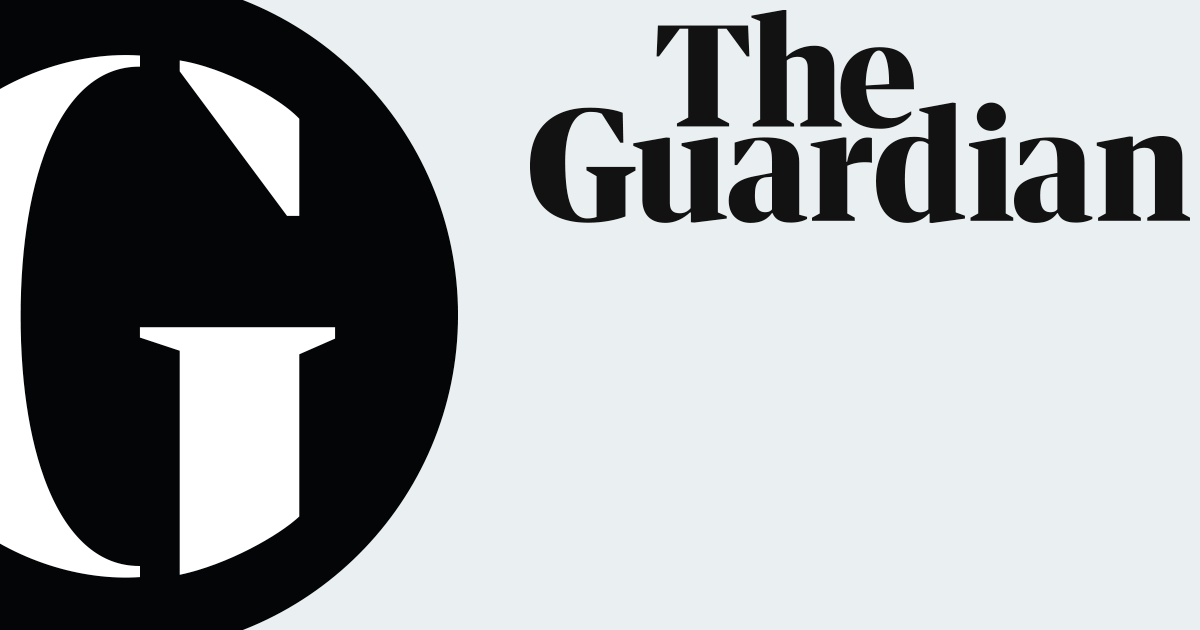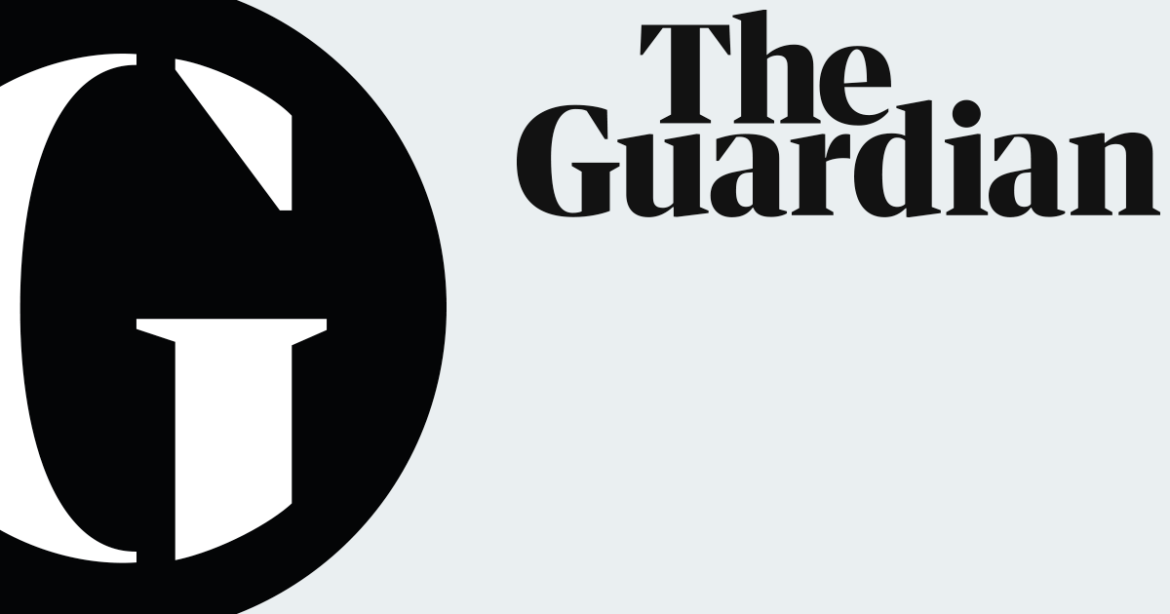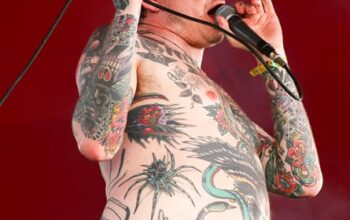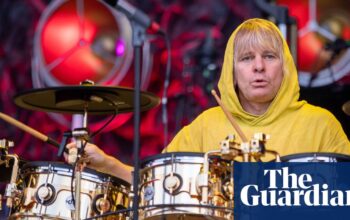
Born in London in 1987, Kate Nash, is an actor and musician. After studying theatre at the Brit School, she was discovered on Myspace and in 2007 released her hit single Foundations. Her debut album, Made of Bricks, went to No 1 and won her a Brit award. After being dropped by her label in 2012, Nash went on to release three albums independently, as well as starring in the Netflix show about female wrestlers, Glow. Her fifth album, 9 Sad Symphonies, is out now. Nash lives in Los Angeles and London.
My mum read somewhere that trampolines were good for exercising if you had asthma, so she got us one. In those six-week summer holidays I’d be on it all the time, fighting and tumbling around with my sisters. I’ve no idea if it helped with my breathing, but it definitely kept me outside and away from the TV.
This photo captures that moment in childhood right before you become self-conscious. All I cared about was swimming, Irish dancing and playing the tin whistle. By the time I finished primary school, I’d started to grow boobs and had become aware of my body, but here I look so confident; as if I think I’m the Fonz.
That said, I remember a piano teacher telling me that I was the world’s worst worrier. Anxiety and overstressing is still a habit. I felt life quite intensely, like all writers do. Maybe that’s why I was tantrumy as a little kid. There were screaming fits that lasted too long: I have this vivid memory of being six and kicking my mum in the face accidentally when I was losing control at bedtime. Thankfully, I now get to channel those big emotions into music.
I went to a Catholic school and grew up in an Irish community in North Harrow, where everyone knew each other. I had a lot of friends, but I wasn’t in the cool club. I mainly admired my older sister who loved garage music. I wanted to be her so badly – I wanted a gold chain and to wear thick white eyeliner, and to have a Wonderbra so I could get cleavage. I started going clubbing as a teenager and that’s really where my love of music, and my dreams of being a musician, started. Although I did have lots of lofty ambitions. My diary says that I wanted to be a singer, an actor, a teddy bear-maker, an ice-cream lady and the prime minister.
I loved going to the Brit School – I soaked up everything and they’d have to kick me out at the end of the day: “Kate, it’s 9pm! Don’t you have a home to go to?” I so desperately wanted a creative job, but got rejected from all of the theatre schools I applied for when I was 17. When all my friends went off to study, I ended up working in Nando’s. I felt so left behind, even if the free chicken was good.
Fortunately, two incidents acted as catalysts that changed my life: I had heart surgery [cardiac radiofrequency ablation to eliminate tachycardia], which made me realise how short life could be. Then I broke my foot. I decided that when it was healed I would make a demo. It was a deal with the universe, something I still do now. I think it’s my OCD: I feel that if I don’t follow it through, then everyone will die. While I was recovering I got into Buzzcocks and realised you could just write about your life. I started making songs and uploaded them to Myspace.
Having a hit song like Foundations makes people feel as if they can say anything audacious to you because you’ve had some kind of success. The press treated women so badly in the 00s and I was caught up in that. Male journalists would write that I was like some whiny teenage girl writing in my diary. Even now it happens. At the Edinburgh festival fringe last year, a drunk guy came up to me and started talking about Foundations: “What happened? You’re not as famous as you used to be, how do you cope with that?”
When I was touring my second album, I was resentful of that achievement. I was worried that Made of Bricks was all the audience wanted. After I got dropped it was a long process to redefine what success was and to keep my self‑esteem afloat. Over the years, some of the funnest memories have been during the bleakest times financially. I remember playing in a pub in Guildford. It was a fun, sweaty show, and I looked around and realised I loved the musicians I played with. There are some superstars with an unfillable cup who could play the Staples Center in Los Angeles and never experience that level of joy.
When Glow came along, it saved my life. I’d trusted the wrong people with my money, which meant I had to sell my flat and move back in with my parents. I’d worked so hard and had nothing to show for it. The worst part was that I knew I wasn’t going to give up. I briefly thought I should become a teacher instead, but then I realised: “How are you going to do that? You don’t even have a degree because you didn’t get into any universities.” Having this career is about fighting your way through it. Push push, tour tour. Other times you get a break that saves you. Fifteen female wrestlers saved me …
after newsletter promotion
The experience of being with so many women who gassed me up, loved my music and put value on me in a way I didn’t, was incredible. That show was the first time I’d encountered an HR department and professionalism in the workplace. I remember thinking: “What? No one here is drunk or high?” If something happened that was inappropriate, I had five people I could go to. In the music industry, it was so chaotic. When I was 17, I’d be hanging out with a bunch of men who would be buying shots and everyone would be trying to get you drunk and shag you. There was nobody to turn to.
Before Glow, I was used to meeting people defensively, probably because of the way the media treated me. I’d think: “You probably don’t like me. You think I’m an idiot. I’m a joke to you.” I’ve always been an open person in spite of that, but I realised I had a chip on my shoulder. Being surrounded by all those supportive strangers changed my life.
Now I’ve got into a nice place where I’m signed to a new label and out of survival mode for the first time in years. I am proud of all the stages of my career, especially Foundations. When I play it, there’s a euphoria in the room. I know the room is going to go wild. Not every musician gets that.
I love being an artist but it’s constant work, especially now music feels as if it’s an industry for the rich. Musicians are making less money, even from touring. But whatever happens, I have my family, my sisters, where I’m from. My childhood set me up to stay connected to something. That’s why I’ve survived the tornado of the past 12 years. No matter how dark the times are, I can come back to that girl in the photo; like a rock to hold on to. Or to a trampoline.
Source: theguardian.com



